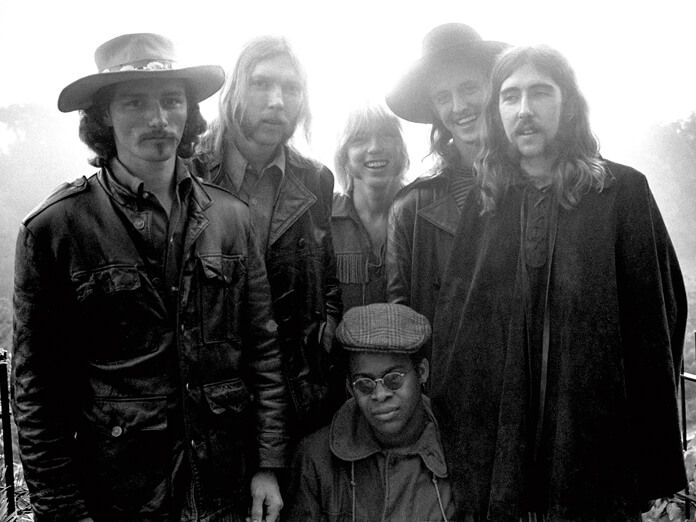It began with a jam. Fresh off a tour with pop star Tommy Roe, Chicago-born bass player Berry Oakley settled down in Sarasota and embedded himself in the local music scene. In the late 1960s he began hosting unrehearsed concerts every Sunday at Willow Branch Park. Free to the public and open to anybody with an instrument, these events gave young musicians from Central Florida an opportunity to play together, share notes, possibly form bands, and of course jam for as long as they liked in whichever directions the music took them.
Most weekends Duane Allman, a burnout on the LA rock scene and a lauded session guitarist looking to launch a solo career, would make the four-hour drive from Jacksonville to sit in on these open-air sessions. The two players developed a close friendship and an even closer musical relationship, and Duane eventually invited Oakley to join his as-yet-unnamed band, pairing him with a guy named Johnny Lee Johnson (known far and wide as Jaimoe) to create a flexible and formidable rhythm section.
As The Allman Brothers Band coalesced into a tight, resourceful sextet – rounded out by Duane’s kid brother Gregg Allman on vocals, Dickey Betts on guitar, and Butch Trucks as a second drummer – they wrote songs out of necessity but jammed with determination. Their first two studio albums flopped primarily because they focused more on the former and less on the latter. What made them legends was 1971’s double live At Fillmore East, which fit a mere seven tracks on four sides and remains one of the most electrifying concert albums ever released. And on “In Memory Of Elizabeth Reed” or even the instrumental portions of the Willie Cobbs cover “You Don’t Love Me”, The Allman Brothers Band managed to shed most of the narcotic associations of rock improvisations: they weren’t setting controls for the heart of the sun like Pink Floyd, nor were they soundtracking your trip like the Grateful Dead.
Instead, their jams sound like expeditions into the dark woods of Southern music and heritage, like opportunities for them to explore old-school rock’n’roll, gritty R&B, Georgia funk, rural blues, ecstatic gospel, even double-jointed jazz. For a demonstration of The Allman Brothers Band’s improvisational powers, spin the live version of “Mountain Jam” they recorded at Watkins Glen, New York, during a show they co-headlined with the Grateful Dead. It’s one of a handful of previously unreleased tracks that sweeten this anniversary boxset. Using the version on their 1972 album Eat A Peach as only a loose blueprint, they settle quickly into the gently rushing rhythm, letting the melody ebb and flow gracefully. No-one really solos; instead, they trade out leads almost telepathically, more like a jazz ensemble than a rock band, which lends the music an organic and unpredictable quality.
Sprawling across 10 LPs or five CDs, Trouble No More showcases a band torn between tight songcraft and wide-open jams, and that conflict would persist even as the lineup changed. The Allman Brothers Band seemingly were always in the process of adding and shedding members, the former usually by incredibly tragic means. Duane Allman was killed in a motorcycle crash in 1971. A year later, Oaklay died the same way.
Their departures destabilised the band for most of that decade, as Gregg Allman and Dickey Betts struggled for control of the group. Betts was responsible for their biggest chart smash and arguably their signature tune, a chugging and catchy number called “Ramblin’ Man” that remains a staple of classic rock playlists. Like Skynyrd’s “Sweet Home Alabama”, it’s become a bit too familiar, overshadowing better and more representative recordings in their catalogue. However, sequenced between the swampy, sarcastic blues “Wasted Words” and the funk-rock workout “Southbound”, its casually racing tempo and jittery sentiments about transience and impermanence sound fresh and lively on Trouble No More, effectively translating blues tropes to the travails of a touring musicians.
Gregg Allman addressed similar themes in his lyrics, but drew more heavily from blues imagery to lend weight to his thoughts on masculinity, heartache, life on the road. While they’re not bogged down by the South’s disreputable iconography – no rebel flags as stage backdrops, for example – The Allman Brothers Band rarely question or upend the received history of their home region, at least not as determinedly as Lynyrd Skynyrd or, decades later, the Drive-By Truckers. As a result, some of their songs sound moored to the past and an older attitude toward race and music. Written and sung by Gregg, “Whipping Post” equates the emotional pain inflicted by a straying women to the physical violence inflicted upon slaves. Despite Duane’s ferocious guitar riffs and the rhythm section’s relentless pace, the song sounds uncomfortably glib 50 years later.
Trouble No More takes its title from the first song the original lineup played together back in 1969, a Muddy Waters cover that set the tone for most nearly everything that followed. It’s also the final song The Allman Brothers Band played at what at the time was their final show on October 28, 2014. That encore, along with their farewell remarks to an audience rowdy in their affection, closes this boxset on a poignant note: “I know you’re leaving,” Gregg Allman rasps, “if you call that gone.” It’s a fitting way to end this 50th-anniversary set, which depicts their entire career as one long, inspired ramble: nobody knew exactly what the next note was going to be, and they all played better for it.
Extras: 8/10. The 10-LP packaging consists of a wood veneer wrapped slipcase with gold graphics, five gatefold jackets and a 56-page book. It includes an 8,900+ word essay on the 50-year history of the band by John Lynskey, unreleased band photos along with newly shot photos of memorabilia from the Big House Museum, Macon, GA and a recap of the 13 incarnations of the lineup.



